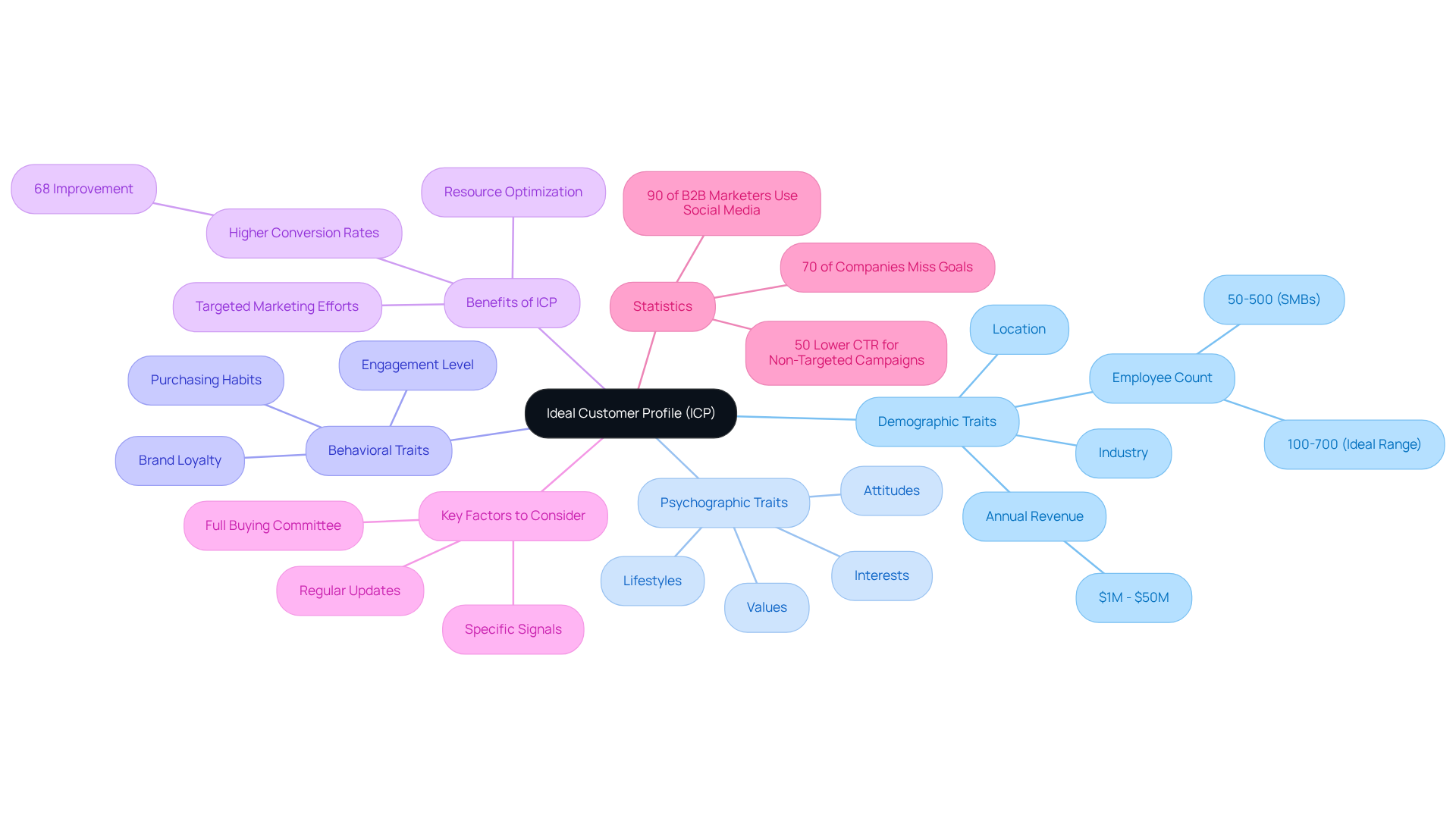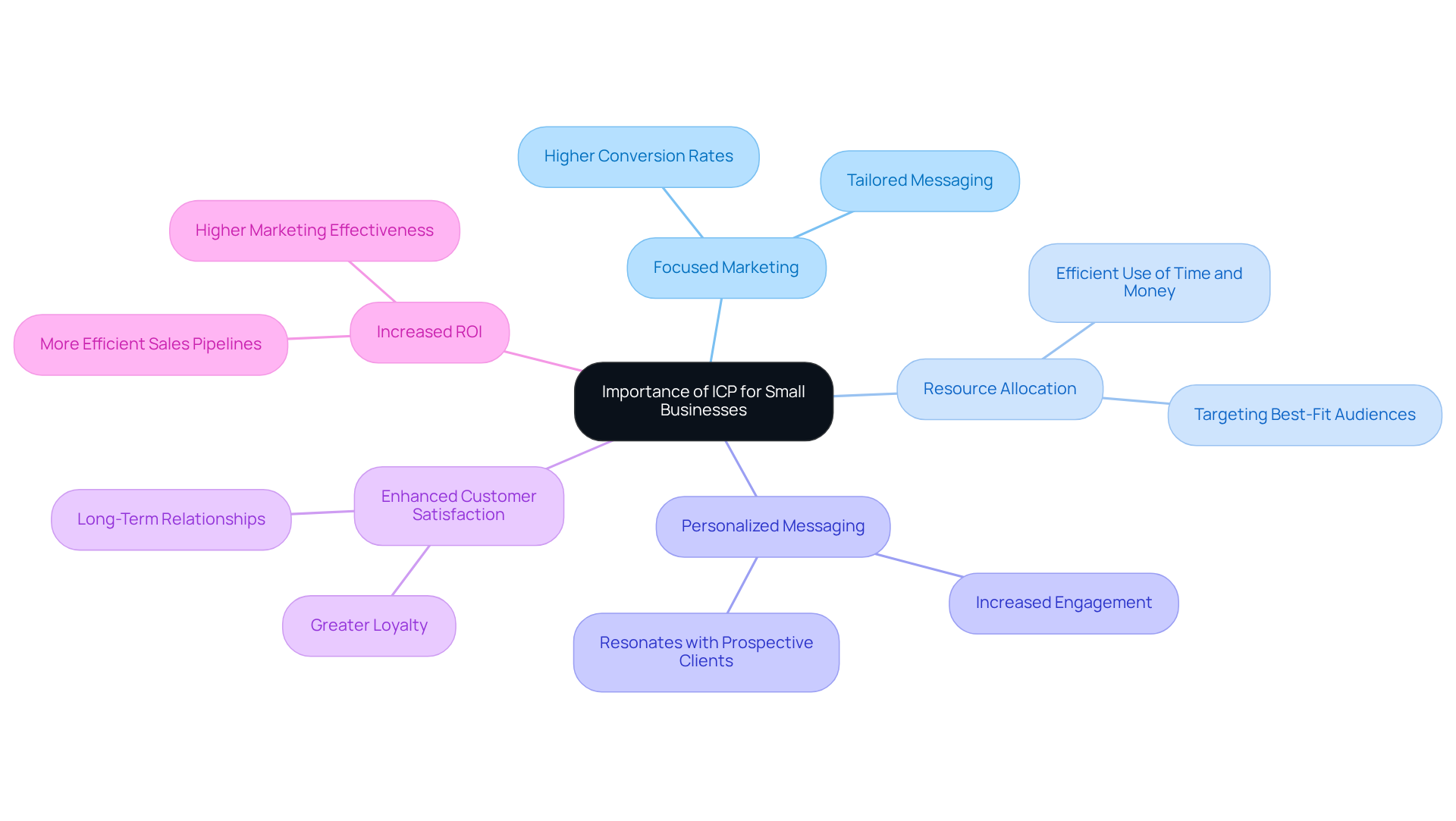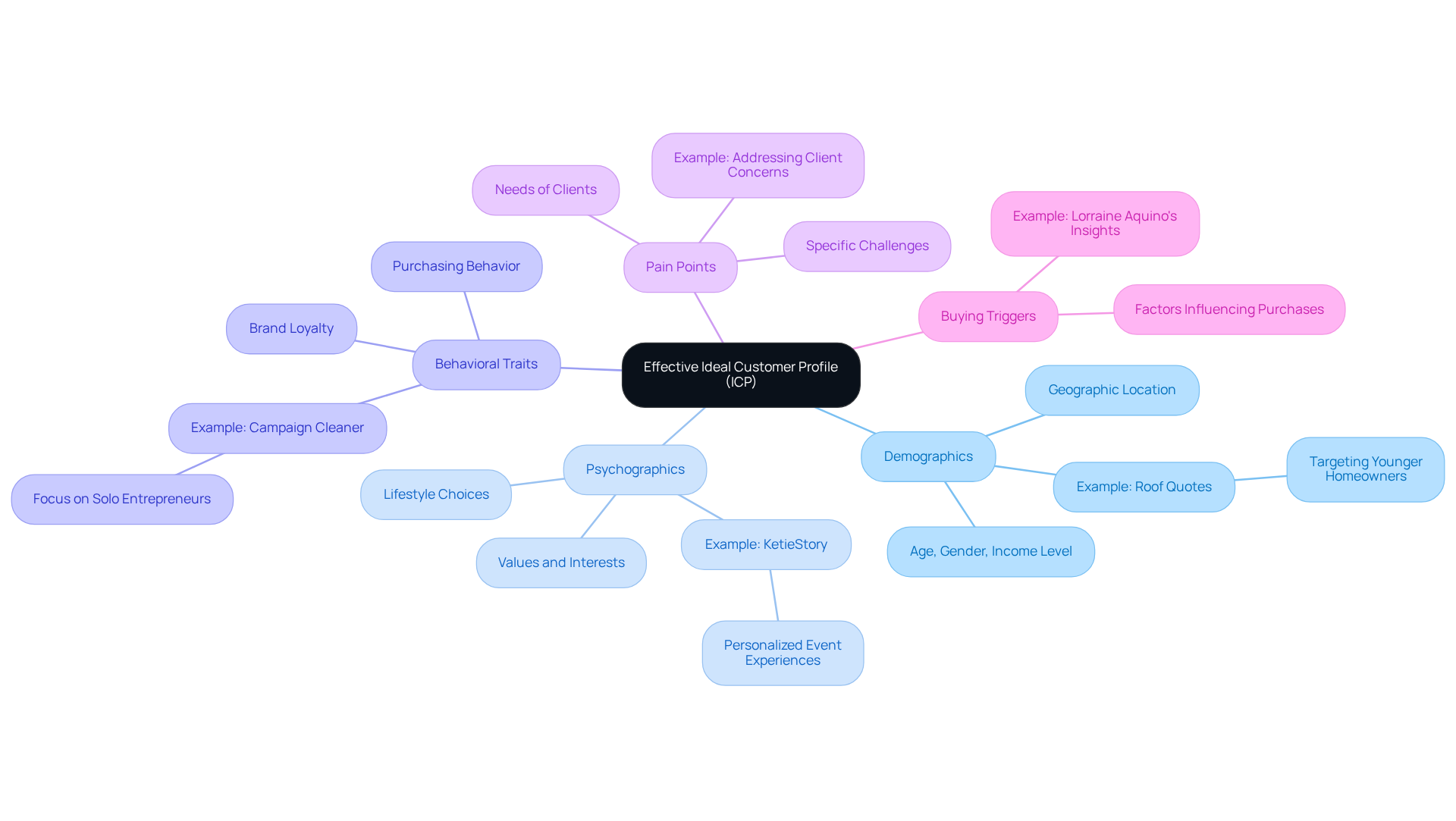Overview
The article highlights the vital role of the Ideal Customer Profile (ICP) in achieving success for small businesses. By understanding and defining an ICP, businesses can effectively target their marketing efforts, which ultimately leads to improved conversion rates.
Have you ever felt overwhelmed by the challenge of reaching your ideal customers? You're not alone. Many businesses find that aligning their strategies with a clear ICP not only enhances customer satisfaction but also increases ROI and streamlines sales processes.
This alignment is crucial for driving growth in today’s competitive market. Together, we can navigate these challenges and unlock your business's potential.
Introduction
Understanding the ideal customer profile (ICP) is more than just a marketing buzzword; it’s a vital strategy that can unlock significant growth for small businesses like yours. By focusing on the specific traits and behaviors of the clients who would benefit most from your offerings, you can tailor your marketing efforts, enhance customer satisfaction, and ultimately drive profitability.
Yet, many small enterprises face challenges in defining their ICP, often missing critical insights that could propel their success. What if the key to transforming your business's outreach and conversion rates lies in a deeper understanding of your ideal customers?
Together, we can explore this crucial aspect and set the stage for your growth.
Define the Ideal Customer Profile (ICP)
The ICP business term is a crucial tool for understanding the segment of clients who can truly benefit from what your company offers. It’s a thoughtful blend of demographic, psychographic, and behavioral traits that define your ideal buyer. Unlike a broad target market, the ICP business term provides a of those most likely to convert, remain loyal, and advocate for your brand. By clearly defining this profile, you can customize your promotional and sales tactics to attract and retain these valuable clients, ultimately driving growth and profitability.
Consider how small businesses in sectors like Technology, Healthcare, or Retail have seen remarkable improvements in conversion rates—up to 68% higher—when aligning their efforts with a well-defined ICP. Understanding the ICP business term is vital; it allows you to prioritize leads based on specific signals and client needs, enhancing engagement while minimizing wasted resources.
Statistics show that 70% of companies missing their revenue and lead goals overlook the full buying committee with their buyer personas. This highlights the necessity of a comprehensive ICP business term. To define an effective ICP, gather insights on key factors like industry, location, employee count, and annual revenue. This ensures that your marketing efforts are directed toward the most promising prospects. Ask yourself: Are you focusing on the right questions to support your decision-making? Consistently refreshing your ICP business term is essential, as organizational needs and customer types evolve over time. This ongoing relevance will empower your outreach strategies and strengthen your connections with clients.

Explain the Importance of ICP for Small Businesses
Establishing an Ideal Customer Profile (ICP) business term is essential for small enterprises because it enables focused marketing efforts, allowing you to allocate resources effectively to engage the right audience. Have you revisited your ICP lately? Industry insights suggest that companies should do so every 6-12 months to stay aligned with market changes. By creating a clear ICP, you can develop personalized messaging that truly resonates with prospective clients, significantly boosting engagement and conversion rates. As Michael Henson wisely notes, 'Developing your perfect client profile could be one of the most crucial actions you take for your small enterprise this year.'
Understanding your target clients not only enhances your product selections but also leads to greater customer satisfaction. This targeted approach enriches lead generation and fosters long-term relationships with clients—an essential element for sustainable growth. Companies that have embraced the ICP business term often report increased ROI from promotions and more efficient sales pipelines. This illustrates the tangible impact of this strategic framework on overall success.
For instance, when businesses focus on their ICP, they achieve more efficient pipelines and greater ROI. This is a testament to the effectiveness of this strategy. Together, we can and work towards success, ensuring that your business thrives in a competitive landscape.

Identify Key Characteristics of an Effective ICP
Creating an Ideal Customer Profile (ICP) is a vital step for small businesses, as understanding the ICP business term helps to refine their marketing and sales strategies. Let’s explore some essential characteristics that can help you connect more deeply with your audience.
- Demographics play a foundational role in defining your target audience. Key factors such as age, gender, income level, education, and geographic location are crucial. For instance, Roof Quotes identified younger homeowners as their target audience, leading to increased interaction and satisfaction, ultimately boosting their conversion rates.
- Next, consider Psychographics. Understanding the of your prospective clients allows you to forge stronger connections. KetieStory, for example, focuses on individuals who value personalized event experiences, fostering trust and rapport that have been essential for their growth.
- Analyzing Behavioral Traits is equally important. By examining purchasing behavior, brand loyalty, and product usage, you can gain insights into consumer interactions. Companies that leverage this data can tailor their offerings to meet specific client needs. Campaign Cleaner, for instance, shifted its focus to solo entrepreneurs, resulting in improved engagement and increased sign-ups.
- Identifying Pain Points is crucial for tailoring solutions that resonate with your audience. By addressing the specific challenges and needs of your clients, you not only alleviate their concerns but also enhance overall satisfaction and retention, leading to a more efficient sales pipeline.
- Lastly, understanding Buying Triggers can inform your promotional strategies. Recognizing what drives your audience to make a purchase can significantly enhance the effectiveness of your campaigns. Lorraine Aquino, an industry expert, emphasizes that attracting the right customers can make all the difference.
By incorporating these traits into the ICP business term, you can effectively direct your sales and promotional efforts. This approach not only enhances lead generation but also strengthens client relationships. Statistics reveal that companies implementing ICPs often experience more efficient pipelines and higher marketing ROI, highlighting the strategic focus necessary for successfully navigating the complexities of client acquisition in today’s competitive landscape. Together, we can achieve success by understanding and addressing the unique needs of your customers.

Conclusion
Defining an Ideal Customer Profile (ICP) is not just a task; it's a pivotal step for small businesses eager to optimize their marketing strategies and enhance customer engagement. By focusing on specific demographic, psychographic, and behavioral traits, you can identify and connect with your most promising prospects. This targeted approach not only boosts conversion rates but also nurtures loyalty and advocacy, paving the way for sustainable growth in a competitive marketplace.
Throughout this article, we've explored the importance of establishing a well-defined ICP. From understanding vital characteristics like demographics and pain points to recognizing the need for regular updates, these elements empower you to tailor your outreach and marketing efforts effectively. Statistics show that companies aligning their strategies with a robust ICP experience significant improvements in their sales pipelines and return on investment.
Ultimately, your journey toward small business success is deeply intertwined with the effective implementation of an Ideal Customer Profile. By prioritizing the development and refinement of your ICP, you can navigate challenges, enhance customer satisfaction, and achieve your growth objectives. Embracing this strategic framework not only strengthens client relationships but also positions you to thrive in an ever-evolving landscape. Taking the time to understand and apply the principles of an ICP can lead to transformative results, ensuring that every marketing dollar spent resonates with the right audience. Together, we can achieve success by making these essential changes.
Frequently Asked Questions
What is an Ideal Customer Profile (ICP)?
An Ideal Customer Profile (ICP) is a detailed representation of the segment of clients who can benefit most from a company's offerings, defined by a combination of demographic, psychographic, and behavioral traits.
How does an ICP differ from a broad target market?
Unlike a broad target market, which encompasses a wide range of potential customers, an ICP provides a focused representation of those most likely to convert, remain loyal, and advocate for the brand.
Why is defining an ICP important for businesses?
Defining an ICP is important because it allows businesses to customize their promotional and sales tactics to attract and retain valuable clients, ultimately driving growth and profitability.
What improvements have small businesses seen by aligning efforts with a well-defined ICP?
Small businesses in sectors like Technology, Healthcare, or Retail have seen remarkable improvements in conversion rates—up to 68% higher—when aligning their efforts with a well-defined ICP.
What are the consequences of not having a comprehensive ICP?
Statistics show that 70% of companies missing their revenue and lead goals overlook the full buying committee with their buyer personas, highlighting the necessity of a comprehensive ICP.
What key factors should be considered when defining an ICP?
Key factors to consider when defining an ICP include industry, location, employee count, and annual revenue.
How can businesses ensure their ICP remains relevant?
Businesses can ensure their ICP remains relevant by consistently refreshing it, as organizational needs and customer types evolve over time.
What is the benefit of regularly updating the ICP?
Regularly updating the ICP empowers outreach strategies and strengthens connections with clients by aligning marketing efforts with current client needs and characteristics.




